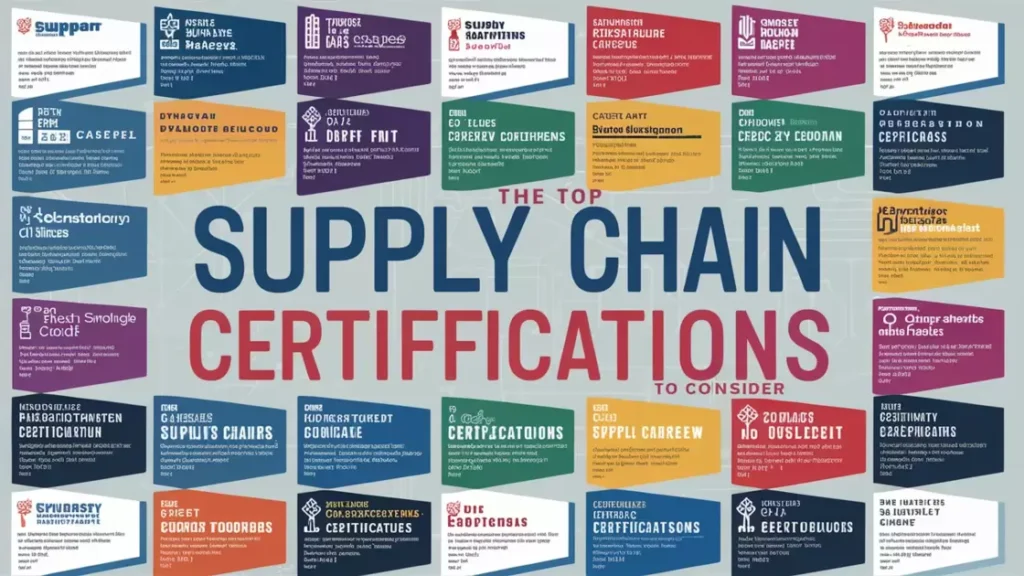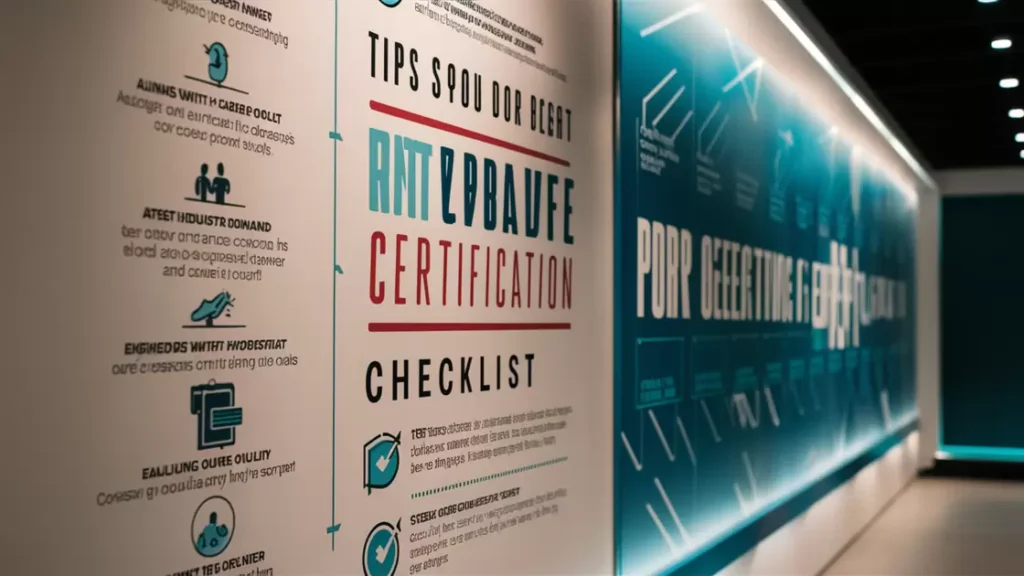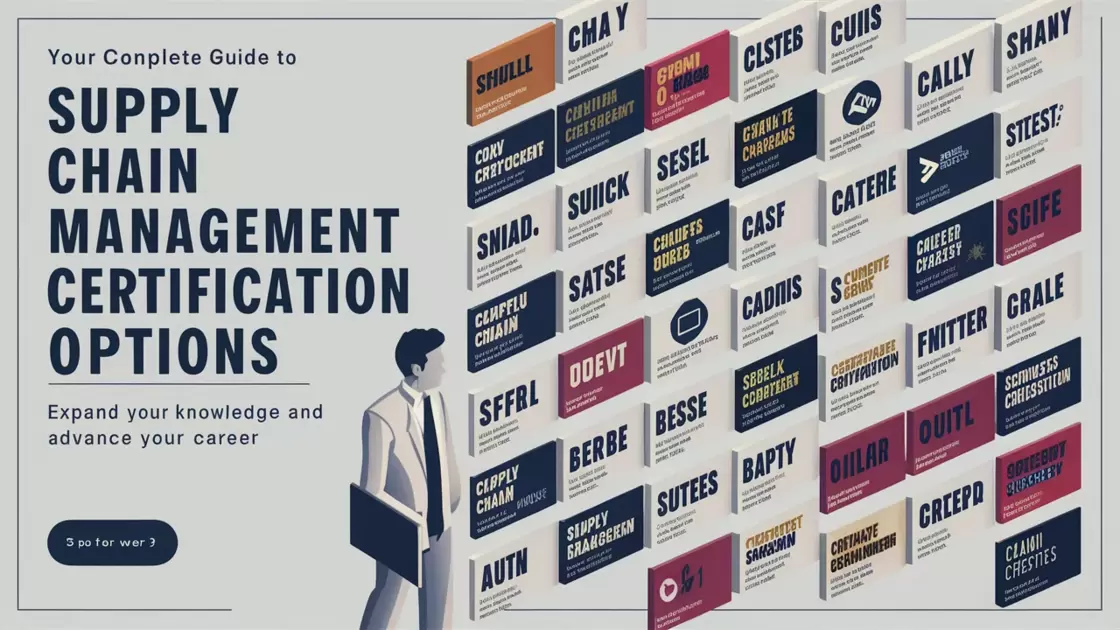You are interested in advancing your supply chain management career Having the right certifications can make a big difference in today’s fast-paced and globally connected business world. Certifications in supply chain management not only help you improve your skills and knowledge, but they also show potential employers that you are an expert, open up new employment opportunities, and raise your earning potential.
It can be difficult to choose the best certification program for your needs because there are so many options. To help you navigate the world of supply chain management certifications, including online options that offer flexibility for working professionals, we have created this comprehensive guide.
Why Get a Supply Chain Management Certification?
Obtaining a certification in supply chain management can help you advance your career in a number of ways. There are numerous compelling reasons to consider certification:
- Enhance Your Skills and Knowledge: Supply chain management certifications provide you with a deep understanding of logistics, operations, procurement, inventory management, and other critical areas. By mastering these skills, you’ll be better equipped to tackle complex challenges and drive efficiencies within your organization.
- Demonstrate Your Expertise: Certificates act as a substantial verification of your insight and obligation to the field. Certified professionals are regarded as more competent and dedicated by employers as a result.
- Increase Job Opportunities and Earning Power: A recent study by the Institute for Supply Management (ISM) found that professionals with certifications in the supply chain make on average 25% more than their non-certified counterparts. Certifications can also lead to new employment opportunities and career advancement.
- Stay Up-to-Date on Latest Trends and Best Practices: The supply chain industry is constantly evolving, with new technologies, regulations, and best practices emerging regularly. Certifications ensure that you remain current with the latest developments and can implement cutting-edge strategies within your organization.
- Gain a Competitive Advantage: A certification in supply chain management can give you a significant advantage over professionals who are not certified in today’s competitive job market. It demonstrates your commitment to professional growth and accomplishment in your field.
Top Supply Chain Certifications to Consider

It is essential to select a certification that complements your career objectives and interests from among the many options available. Some of the most prestigious and sought-after certifications in the supply chain are as follows:
APICS Certifications
The leading authority on supply chain education and certification is APICS (The Association for Supply Chain Management). Employers all over the world recognize and value their certifications.
Certified Supply Chain Professional (CSCP)
The CSCP certification is intended for professionals involved in global supply chain operations’ planning, implementation, and coordination. It covers supply chain design, logistics, procurement, and inventory management, among other aspects of supply chain management.
- Who It’s Best For: Mid-level to senior-level supply chain professionals with at least three years of related business experience.
- Prerequisites: None, but APICS recommends candidates have a working knowledge of supply chain concepts and technology.
- Exam Details: One computer-based exam (180 multiple-choice questions) with a 3.5-hour time limit.
- Study Resources: APICS provides official study materials, including the CSCP Learning System, online courses, and practice exams.
- Cost: APICS membership ($200 annually) + Exam fee ($965 for members, $1,265 for non-members).
- Certifying Organization: APICS
Certified in Production and Inventory Management (CPIM)
The CPIM certification is focused on production and inventory management concepts and techniques. It covers topics such as demand management, operational planning, materials and capacity planning, and quality control.
- Who It’s Best For: Professionals involved in production, inventory management, operations, and materials management roles.
- Prerequisites: None, but APICS recommends candidates have a basic understanding of production and inventory management concepts.
- Exam Details: Five computer-based exams (80-100 multiple-choice questions each) with a 3-hour time limit per exam.
- Study Resources: APICS CPIM Learning System, online courses, and practice exams.
- Cost: APICS membership ($200 annually) + Exam fee ($965 for members, $1,265 for non-members) for all five exams.
- Certifying Organization: APICS
Certified Logistics Transportation and Distribution (CLTD)
The CLTD certification focuses on logistics, transportation, and distribution concepts and strategies. It covers topics such as logistics network design, order management, inventory management, and transportation operations.
- Who It’s Best For: Professionals working in logistics, transportation, distribution, and supply chain management roles.
- Prerequisites: None, but APICS recommends candidates have a basic understanding of logistics and supply chain concepts.
- Exam Details: One computer-based exam (135 multiple-choice questions) with a 3-hour time limit.
- Study Resources: APICS CLTD Learning System, online courses, and practice exams.
- Cost: APICS membership ($200 annually) + Exam fee ($965 for members, $1,265 for non-members).
- Certifying Organization: APICS
ISM Certifications
The Institute for Supply Management (ISM) is another leading organization that offers respected certifications in the supply chain and procurement fields.
Certified Professional in Supply Management (CPSM)
The CPSM certification is designed for professionals involved in the procurement and supply management functions. It covers various aspects of the procurement process, including supplier relationship management, cost management, and risk management.
- Who It’s Best For: Supply management professionals with at least three years of relevant experience in procurement and supply management roles.
- Prerequisites: None, but ISM recommends candidates have a strong understanding of supply management concepts and practices.
- Exam Details: Three computer-based exams (165 multiple-choice questions each) with a 3-hour time limit per exam.
- Study Resources: ISM provides official study materials, including the CPSM Study Guide, online courses, and practice exams.
- Cost: ISM membership ($184 annually) + Exam fee ($874 for members, $1,374 for non-members) for all three exams.
- Certifying Organization: ISM
Certified Professional in Supplier Diversity (CPSD)
The CPSD certification focuses on supplier diversity strategies and best practices. It covers topics such as supplier diversity program development, supplier identification and selection, and measuring program performance.
- Who It’s Best For: Professionals involved in supplier diversity programs, procurement, and supply chain management roles.
- Prerequisites: None, but ISM recommends candidates have a basic understanding of supplier diversity concepts and practices.
- Exam Details: One computer-based exam (100 multiple-choice questions) with a 2-hour time limit.
- Study Resources: ISM provides official study materials, including the CPSD Study Guide, online courses, and practice exams.
- Cost: ISM membership ($184 annually) + Exam fee ($374 for members, $574 for non-members).
- Certifying Organization: ISM
Other Respected Certifications
While APICS and ISM offer some of the most well-known supply chain certifications, there are several other respected certifications worth considering:
SCPro (Supply Chain Professional) from CSCMP
The SCPro certification is offered by the Council of Supply Chain Management Professionals (CSCMP). It covers a broad range of supply chain management topics, including logistics, operations, procurement, and transportation.
PMP (Project Management Professional) from PMI
The Project Management Professional (PMP) certification from the Project Management Institute (PMI) is widely recognized across industries, including supply chain management. As many supply chain initiatives involve project management, the PMP certification can be a valuable addition to your skillset.
Lean Six Sigma Certification
Lean Six Sigma is a methodology focused on process improvement and waste reduction. Certifications in Lean Six Sigma, such as Green Belt or Black Belt, can be beneficial for supply chain professionals seeking to optimize processes and drive operational excellence.
Recommended this blog: Unraveling the Software Supply Chain
Online vs In-Person Certification Programs

Supply chain management certifications can be obtained through various delivery methods, including traditional classroom-based programs and online or self-paced options. Each format has its own advantages and considerations:
Online Certification Programs
- Flexibility: Online programs offer the convenience of studying at your own pace and on your own schedule, making them ideal for working professionals or those with busy lifestyles.
- Geographic Independence: With online courses, you can access study materials and take exams from anywhere in the world, eliminating the need for travel or relocation.
- Cost-Effective: Online programs often have lower costs compared to in-person programs, as they eliminate expenses like travel, accommodation, and classroom rental fees.
- Self-Paced Learning: Many online programs allow you to learn at your own pace, providing flexibility to fit your study schedule around work and personal commitments.
- Potential Drawbacks: Online learning requires self-discipline and motivation to stay on track. Some learners may find it challenging to stay engaged without the structure and accountability of a physical classroom setting.
Examples of top online certification providers in supply chain management include:
- APICS eLearning: APICS offers online courses, self-study materials, and virtual instructor-led training for their CSCP, CPIM, and CLTD certifications.
- EducationEdge: This online platform provides comprehensive training programs for various supply chain certifications, including APICS, ISM, and CSCMP certifications.
- SupplyChainCertifications.com: Offers online courses and exam preparation materials for supply chain certifications like CSCP, CPIM, and CLTD.
In-Person Certification Programs
- Classroom Learning: In-person programs provide a structured classroom environment, which can be beneficial for learners who thrive in a more traditional educational setting.
- Instructor Interaction: Face-to-face interaction with instructors allows for immediate feedback, clarification of concepts, and opportunities for hands-on learning activities.
- Networking Opportunities: Classroom-based programs often provide valuable networking opportunities with fellow students and industry professionals.
- Potential Drawbacks: In-person programs may require travel and accommodation expenses, making them more costly. They also offer less flexibility in terms of scheduling and location.
Many universities, community colleges, and professional training organizations offer in-person certification programs for supply chain management. Some examples include:
- Michigan State University’s Supply Chain Management Program: Offers in-person courses and preparation for APICS certifications like CSCP and CPIM.
- Penn State’s Supply Chain Education Programs: Provides classroom-based training for various supply chain certifications, including APICS and ISM certifications.
Hybrid Certification Programs
Some organizations offer hybrid certification programs that combine the benefits of online and in-person learning. These programs typically involve online self-study materials and virtual instruction, supplemented by in-person workshops, seminars, or exam preparation sessions.
Hybrid programs can provide the flexibility of online learning while still offering opportunities for face-to-face interaction and hands-on activities. Examples of organizations offering hybrid certification programs include APICS, ISM, and various universities and training providers.
Tips for Selecting the Right Certification

With so many supply chain management certifications to choose from, it’s essential to carefully evaluate your options and select the one that best aligns with your career goals and interests. Here are some tips to help you make an informed decision:
- Consider Your Career Goals and Experience Level: Assess your current role, future aspirations, and level of experience in the supply chain field. Different certifications may be more relevant or beneficial depending on your specific goals and background.
- Look at Exam Prerequisites, Costs, and Study Requirements: Carefully review the prerequisites, exam details, study materials, and costs associated with each certification. Ensure that you meet the eligibility requirements and are prepared to invest the time and resources necessary for exam preparation.
- Research Market Value and Recognition from Employers: While all reputable certifications carry weight, some may be more widely recognized or valued by employers in your industry or geographic region. Consider conducting market research or reaching out to professionals in your desired field to gauge the perceived value of different certifications.
- Make a Long-Term Career Plan: Supply chain management certifications can often be “stacked” or combined to demonstrate a broader range of expertise. Consider your long-term career goals and choose certifications that complement each other and support your desired professional path.
- Evaluate the Certifying Organization’s Reputation: Research the credibility and reputation of the certifying organization. Look for organizations that are well-established, have rigorous certification standards, and are recognized by employers and industry experts.
- Assess Your Learning Style: Determine whether you prefer self-paced online learning, traditional classroom settings, or a hybrid approach that combines both. Choose a certification program that aligns with your preferred learning style to increase your chances of success.
By carefully considering these factors, you can select the supply chain management certification that best fits your needs, goals, and learning preferences, setting you up for success in your career.
How to Prepare and Study for the Exams
Earning a supply chain management certification typically involves passing one or more exams, which can be challenging and require thorough preparation. Here are some tips to help you prepare effectively and increase your chances of success:
- Use Official Study Materials: Most certifying organizations provide official study materials, such as textbooks, study guides, practice exams, and online courses. These resources are designed specifically for the certification exams and are often the most reliable and up-to-date sources of information.
- Enroll in Exam Prep Courses: Many organizations and training providers offer exam preparation courses, either in-person or online. These courses can provide structured learning, expert instruction, and focused guidance on the exam content and question formats.
- Join Study Groups or Online Communities: Participating in study groups or online communities can be a valuable resource for sharing knowledge, asking questions, and getting support from others preparing for the same certification exams.
- Take Practice Tests: Most certifying organizations offer practice exams or sample questions that can help you assess your knowledge gaps and familiarize yourself with the exam format and question types. Practice tests can also help you develop effective test-taking strategies.
- Allow Sufficient Study Time: Allocate enough time for thorough preparation based on the difficulty and scope of the certification program. Some certifications may require several months of dedicated study, while others may be less time-intensive.
- Get Hands-On Supply Chain Experience: Whenever possible, try to gain practical experience in supply chain management roles or projects. Real-world experience can reinforce the concepts you’re studying and better prepare you for applying your knowledge in actual job situations.
- Stay Organized and Motivated: Develop a study plan, set achievable goals, and find ways to stay motivated throughout the preparation process. Celebrating small milestones and rewarding yourself can help maintain your focus and commitment.
By following these study strategies and putting in the necessary effort, you can increase your chances of success on the supply chain management certification exams and take a significant step towards advancing your career.
Maintaining and Renewing Your Certification

Earning a supply chain management certification is a significant accomplishment, but it’s essential to keep in mind that most certifications have ongoing requirements for maintenance and renewal. Here’s what you need to know about maintaining and renewing your certification:
- Ongoing Education Requirements: Many certifications require you to complete a certain number of continuing education or professional development hours within a specified time frame. This helps ensure that your knowledge and skills remain up-to-date with industry changes and best practices.
- Periodic Renewals: Most certifications have an expiration date and need to be renewed periodically, typically every 2-5 years. Renewal processes may involve submitting evidence of continued professional development, retaking exams, or paying renewal fees.
- Opportunities for Specialization: Some certifying organizations offer specialized endorsements or concentrations within their certification programs. These specializations can allow you to demonstrate expertise in specific areas of supply chain management, such as logistics, procurement, or inventory management.
- Benefits of Holding Multiple Certifications: While earning a single certification is an impressive achievement, holding multiple complementary certifications can further enhance your credibility and demonstrate a well-rounded skill set. For example, combining a CSCP certification with a PMP or Lean Six Sigma certification can make you a more valuable asset to employers.
To maintain your certifications and stay ahead in the field, it’s crucial to stay informed about the renewal requirements and deadlines set by the certifying organizations. Additionally, actively pursuing professional development opportunities, attending industry events, and staying up-to-date with industry trends can help ensure that your knowledge and skills remain current and relevant.
Conclusion
Certifications in supply chain management are potent tools for professionals who want to advance in their careers, improve their skills, and show that they are experts in this ever-changing field. You can unlock new opportunities, increase your earning potential, and gain a competitive edge in the job market by obtaining the appropriate certification.
We’ve looked at some of the most prestigious and sought-after certifications in supply chain management in this comprehensive guide, including those offered by APICS, ISM, and other organizations. We’ve talked about the advantages of certification, given an in-depth look at various certification programs, and given advice on how to choose the right certification for your goals and preferences in learning.
The key to success is thorough preparation, dedication, and a commitment to ongoing professional development, regardless of whether you opt for an online certification program or a more conventional in-person format. You can increase your chances of passing the certification exams and taking the exam by following the study strategies and recommendations in this guide.


![Find a Section 8 houses for rent with no deposit Revealed! [2024]](https://busslirra.com/wp-content/uploads/2024/08/Find-a-Section-8-houses-for-rent-with-no-deposit-Revealed-2024-300x157.jpg)







![Find a Section 8 houses for rent with no deposit Revealed! [2024]](https://busslirra.com/wp-content/uploads/2024/08/Find-a-Section-8-houses-for-rent-with-no-deposit-Revealed-2024-150x150.jpg)
